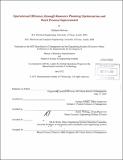Operational efficiency through resource planning optimization and work process improvement
Author(s)
Balwani, Siddharth (Siddharth Vashdev)
DownloadFull printable version (22.30Mb)
Other Contributors
Leaders for Global Operations Program.
Advisor
Georgia Perakis and Daniel Whitney.
Terms of use
Metadata
Show full item recordAbstract
This thesis covers work done at National Grid to improve resource planning and the execution of pipeline construction and maintenance work carried out at the yards. Resource Planning, the art of picking the right jobs for the right days and assigning the right crews to them while meeting constraints of regulation, customer service, and safety at the minimum cost is an extremely difficult problem. This is exacerbated by the fact that there needs to be enough slack in the system to deal with one or more pipeline leaks that may be called in. At the execution stage, when the jobs are carried out by crews, the lack of standardization in work processes dealing with granting and approval of overtime, productivity tracking, data collection, and imperfect alignment of incentives make it difficult to get the best work from the crews. These issues lead to high levels of overtime at yards, which are the major source of costs for gas operations for the company. We propose the Resource Allocation and Planning Tool (RAPT) accompanied by yard level process management to improve operations performance. To automate short term planning, RAPT includes a two stage stochastic optimization model to perform job scheduling and crew assignment in the presence of a variable number of emergency leaks, thus creating optimal daily and weekly plans with minimal overtime costs. The tool also serves as a business intelligence platform, providing a companywide view of gas operations efficiency and as a decision aid, enabling management to predict the impact of management policies on field operations. The execution of work was improved by the creation of new processes for scheduling, crew data entry, overtime approval, incorporating accountability and oversight at multiple levels. This work has enabled more consistent processes, better overtime and productivity management, and the ability to understand and track deviations. These changes are currently being piloted at yards across the company and the initial results are very encouraging. As a direct result of this work, National Grid has the potential to achieve up to 65% reduction in overtime, saving the company a substantial amount of money.
Description
Thesis (S.M.)--Massachusetts Institute of Technology, Engineering Systems Division; and, (M.B.A.)--Massachusetts Institute of Technology, Sloan School of Management; in conjunction with the Leaders for Global Operations Program at MIT, 2012. Cataloged from PDF version of thesis. Includes bibliographical references (p. 84-85).
Date issued
2012Department
Leaders for Global Operations Program at MIT; Massachusetts Institute of Technology. Engineering Systems Division; Sloan School of ManagementPublisher
Massachusetts Institute of Technology
Keywords
Engineering Systems Division., Sloan School of Management., Leaders for Global Operations Program.